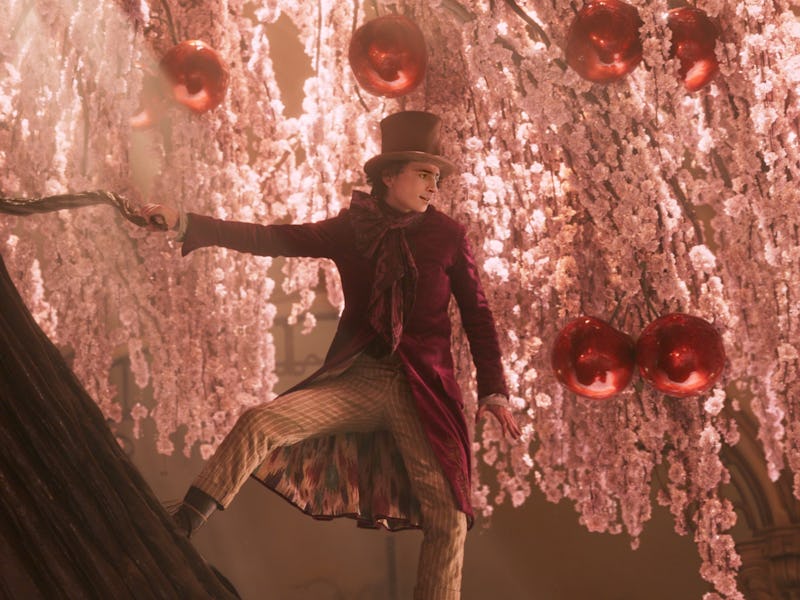Wonka Brings Hollywood’s Turbulent Year to a Fascinating End
Is Hollywood a land of Pure Imagination anymore? Has it ever been?

Wonka is a lot of things, but a logical prequel to 1971’s Willy Wonka & the Chocolate Factory isn’t one of them. The new film from Paddington 2 director Paul King is a family-friendly comedy that’s overflowing with optimism and obvious moral lessons. It isn’t particularly weird, nor is it the least bit scary, which makes it an undeniably strange companion piece to both Mel Stuart and Tim Burton’s previous Willy Wonka movies. It’s a musical full of earnest songs, earnestly sung.
And yet Wonka still carries more weight than one might expect. The film, which purports to tell the origin story of its eponymous chocolatier (played with admiral zeal by Timothée Chalamet), paints Willy Wonka as a young artist trying to make his mark in an industry run and lorded over by the same select executives who have been in control of it for decades. When Willy introduces something new to the chocolate market, they respond aggressively.
Coming from the David Zaslav-run Warner Bros., Wonka feels like an unexpectedly bracing response to the current state of Hollywood.
Wonka is a bright, cheery musical that has more to say about the current state of Hollywood than it lets on.
Shortly after Timothée Chalamet’s Willy makes his chocolate-selling debut in Wonka’s first act, he’s confronted by the three heads of the world’s foremost Chocolate Cartel: Arthur Slugworth (Paterson Joseph), Gerald Prodnose (Matt Lucas), and Felix Fickelgruber (Mathew Baynton). They publicly denounce his chocolates — criticizing them for being too complicated and “weird” — before using their connections with the local police force to ban Willy from selling any of his chocolates to the candy-loving masses. Later, it’s revealed that — despite being competitors — Slugworth, Prodnose, and Fickelgruber have been secretly working together for years to dilute their chocolate so that their customers want and expect less flavorful products from them.
Through his and his friends’ combined wit and courage, Willy eventually exposes the Chocolate Cartel for the corporate criminals they are and becomes the world’s No. 1 chocolatier. The film’s ending subsequently sets the stage for his dominance over the very industry that he had to try so hard to break into in the first place.
Ignoring Willy’s eventual, inevitable victory, though, there’s something genuinely chilling about Wonka’s Chocolate Cartel and how they operate within the film’s lightly fantastical world. It’s not just how maliciously they try to hold onto their monopolistic control of the chocolate industry that strikes a nerve, either, but also their desire to erase any products that might outshine their own, purposefully diluted ones.
As they explain in their first Wonka scene, the three businessmen believe that their customers should only be given what they’ve already had for years and nothing more. They insist that chocolate snacks should be basic, simple, straightforward, and — most importantly — familiar. One doesn’t need to strain too hard to see the parallels between the Chocolate Cartel’s behavior and that of the studio heads who have not only become increasingly reliant on pre-existing properties and franchises (i.e., familiar chocolates from familiar brands) but who have also turned Hollywood into an industry that is inhospitable and hostile to any new voices hoping to break into it.
Wonka may be a product of Hollywood’s unrelenting IP wave, but it’s one that advocates strongly against its own existence.
At the center of both of this year’s labor strikes were the WGA and SAG-AFTRA’s efforts to make sure that screenwriting and screen acting could continue to be financially viable careers for up-and-coming writers and actors. The two guilds seemed to have succeeded in doing that in a year that has also seen Hollywood’s unrelenting focus on superheroes, cinematic universes, pre-existing pieces of IP, and brand names come back to bite it several times over.
Will Hollywood ever become, as Chalamet’s Willy sings at the end of Wonka, a land of Pure Imagination again? It seems unlikely, given the corporate interests that are in control of it now. Either way, Wonka has emerged as one of the year’s most interesting blockbusters if only because its themes stand in such fierce opposition to the beliefs of those who financed and oversaw its production. It’s a film with a surprising amount on its mind.
Just don’t tell Hollywood’s CEOs that.